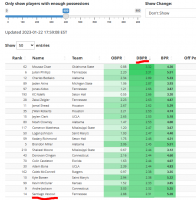You are using an out of date browser. It may not display this or other websites correctly.
You should upgrade or use an alternative browser.
You should upgrade or use an alternative browser.
Top defenders in the country according to defensive PBR
- Thread starter Freak
- Start date
JohnnyJava
Subversive iconoclast
- Joined
- Sep 1, 2015
- Messages
- 1,270
- Likes
- 2,602
I think it was the mid week game a week and a half ago, but regardless, the stats are cumulative season long stats. Even if 20 percent of the season has occurred since that quote, 80 percent of the season occurred before the quote. And JPs numbers are WAY ahead of any other UT player. Has JP really played like the national defensive player of the year? I don’t think so. If you look at the description of the methodology used, it has a lot of intertwined factors and assumptions as well as ambiguous wordings (play by play impact?). I’m glad JP is on our team and I think he has improved as the year has gone by, but I’m not buying this statisticians’s analysis that he has been possibly the best defensive player in the nation.That news was 2-3 weeks ago or longer, as commentators don’t follow us day-to-day. The recent narrative from Barnes himself is a very positive commentary on Phillips’ defensive improvements.
VolsFan-TX
Well-Known Member
- Joined
- Jan 22, 2011
- Messages
- 3,405
- Likes
- 5,373
From website (definition of DPBRIf you go to Evan Miyakawa’s website, you can read where Julian Phillips is UT’s best defensive player by a wide margain. I’m not buying whatever statistical algorithms that have led to that conclusion. Rick Barnes apparently isn’t buying it either, because the color commenter just a couple of games ago relayed how Barnes was getting after JP at practice asking him when he was ever going to help the team defensively.
- DBPR: Defensive Bayesian Performance Rating reflects the defensive value a player brings to his team when he is on the court. This rating incorporates a player's individual efficiency stats and on-court play-by-play impact, and also accounts for the defensive strength of other teammates on the floor with him, along with the offensive strength of the opponent's players on the floor. DBPR is interpreted as the number of defensive points per 100 possessions better than (below) D1 average expected to be allowed by the player's team if the player were on the court with 9 other average players. A higher rating is better.
BigBadVol
The MojoMofo
- Joined
- Feb 2, 2010
- Messages
- 5,008
- Likes
- 10,759
Ok, I need a breakdown. What does OBPR, DBPR & BPR mean?
Bayesian Performance Rating (BPR), to quantify how successful a team or player is, using play-by-play data and advanced box-score metrics. This metric is predictive in nature, which means that each rating is fine-tuned to predict performance in future games. Each team and player has an offensive rating (OBPR) and a defensive rating (DBPR) which sum together to form the overall rating (BPR).
Bayesian Performance Rating (BPR), to quantify how successful a team or player is, using play-by-play data and advanced box-score metrics. This metric is predictive in nature, which means that each rating is fine-tuned to predict performance in future games. Each team and player has an offensive rating (OBPR) and a defensive rating (DBPR) which sum together to form the overall rating (BPR).
Last edited:
youcancallmeAl
Well-Known Member
- Joined
- Mar 8, 2021
- Messages
- 6,587
- Likes
- 16,875
The rare moments I “pay attention”, I don’t SEE him shutting his guy down or forcing into bad shots. Whoever “we” is can take it or leave it. I did invite myself into this nerd party and the birth control glasses are getting steamed. I’ll invite myself out.
I see him shut his guy off from drives a lot. I see him help others on defense a lot. I see him disrupt opposing offenses a lot, with steals, deflections, anticipating passes, etc. When I watch, he is an excellent - if not elite - defender.
OrangeYouGlad
Active Member
- Joined
- Nov 28, 2012
- Messages
- 41
- Likes
- 68
cardvolfan
Well-Known Member
- Joined
- Oct 13, 2007
- Messages
- 9,851
- Likes
- 19,751
butchna
Sit down and tell me all about it...way over there
- Joined
- Jan 6, 2013
- Messages
- 106,123
- Likes
- 221,349
tennesseeduke
Well-Known Member
- Joined
- Jul 11, 2012
- Messages
- 8,669
- Likes
- 9,336
omghulkhands
Well-Known Member
- Joined
- Oct 23, 2010
- Messages
- 12,097
- Likes
- 14,374
cardvolfan
Well-Known Member
- Joined
- Oct 13, 2007
- Messages
- 9,851
- Likes
- 19,751
I do find it very interesting that Brandon Miller is #5 in this and Julian Phillips is #6. In various recruiting services prior to signing, these guys were rated very evenly across the board.When you sort the data to only show players that have played a minimum 400 Possessions, he clocks in at 24th for DBPR.
FWIW, he is also the number 14 rated overall player according to his metrics.
View attachment 532510
thunder5
Cause I like to party
- Joined
- Jan 19, 2006
- Messages
- 10,419
- Likes
- 8,319
wmcovol
Well-Known Member
- Joined
- Jan 10, 2012
- Messages
- 18,403
- Likes
- 33,126
volsarelife1
Well-Known Member
- Joined
- Jul 15, 2017
- Messages
- 13,149
- Likes
- 16,761
butchna
Sit down and tell me all about it...way over there
- Joined
- Jan 6, 2013
- Messages
- 106,123
- Likes
- 221,349
cardvolfan
Well-Known Member
- Joined
- Oct 13, 2007
- Messages
- 9,851
- Likes
- 19,751



